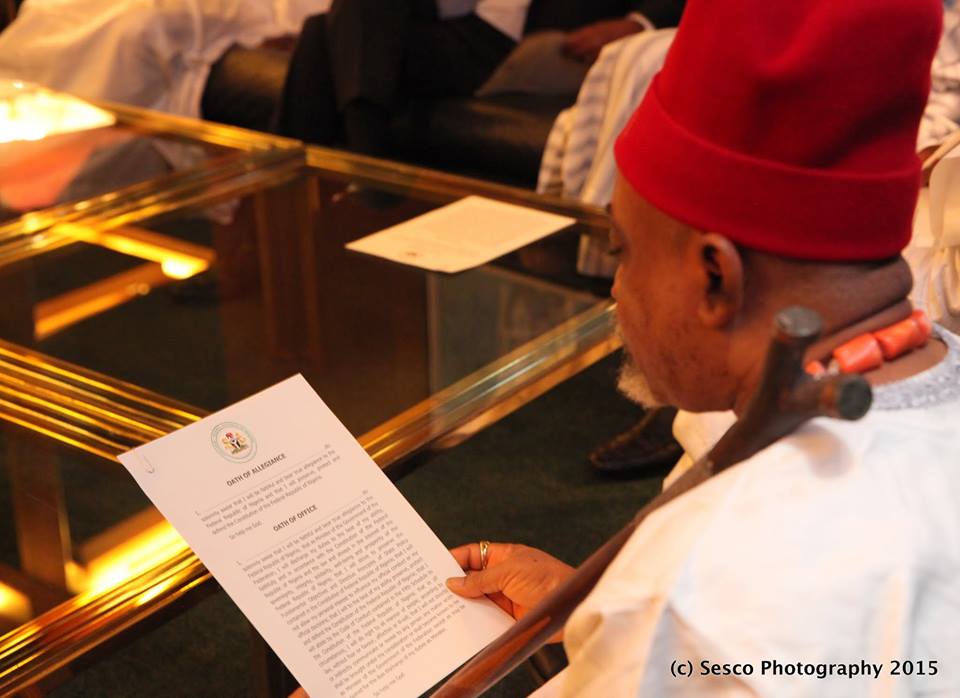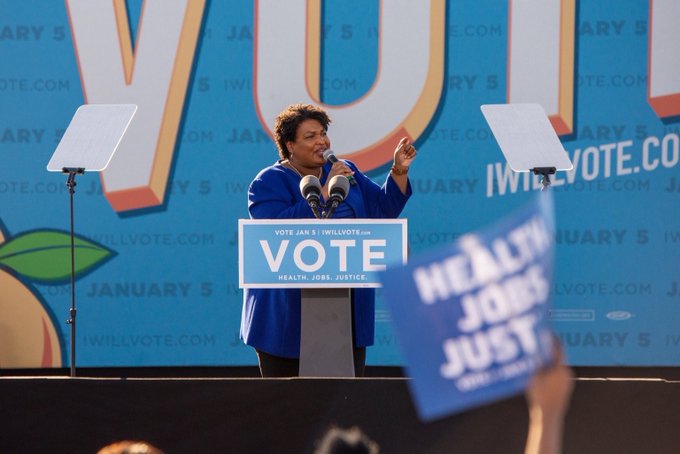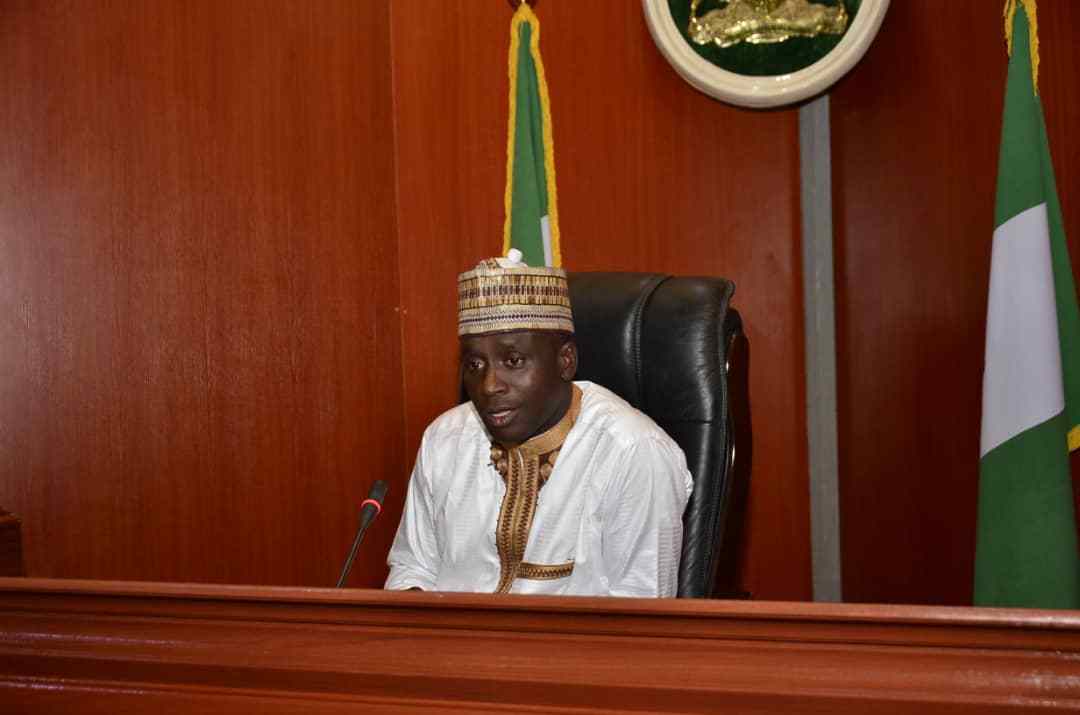Minister of Labour and Employment, Senator Chris Ngige
BY VICTOR AKHIDENOR
The Federal Ministry of Labour and Employment was established as a department in the Colonial Governor’s Office in 1932. It became a full-fledged ministry in 1952 with a network of 36 state labour offices, the FCT labour office, and 23 district labour offices with about 4,000 staff members. The functions and responsibilities of the ministry are captured in Section 169, item 34, Second Schedule under the Exclusive Legislative List of the 1999 Constitution of the Federal Republic of Nigeria (as amended).
The ministry is responsible for labour administration in Nigeria and it includes the preparation, formulation, coordination, monitoring, review, implementation and enforcement of all government policies and regulations which relate to employment generation, labour protection, productivity improvement, industrial peace and harmony, occupational safety and health in workplaces.
Let us state upfront, the performance problem: the inability of sanctioning non-complying organisations because of lack of efficient and effective enforcement system. The functions of Inspectorate division (which I have chosen among the many divisions in the ministry to expose its performance problem) are to ensure adequate compliance with the labour laws through regular and sustained inspection of industrial, commercial and agricultural establishments; monitor the terms and conditions of employment in workplaces; collates, analyses and interprets the inspection reports from the field offices for national reporting; Coordinates, implements and monitors child labour, forced labour and child/human trafficking across the country; educate and build the capacity of professional officers of the ministry, employees and employers on labour administration and emerging trends in the world of work; ensure fair labour practices through intervention and handling of a labour complaint; ensure gender equality through gender mainstreaming in the world of work; ascertain that the statutory provisions on the terms and conditions of work are satisfied in order to ensure the welfare and protection of workers; monitor and surveys Labour Health Areas to ensure the protection of workers and compliance with extant labour laws, policies and regulations, and provide relevant professional advisory services to the management, workers and state governments.
The key function of the department which is to ensure adequate compliance with the labour laws has become a major performance problem. The department only ensures, on paper, adequate compliance with the labour laws through regular and sustained inspection of industrial, commercial, and agricultural establishments.
Advertisement
The ministry, through the Inspectorate department, has the statutory responsibility of providing effective and efficient labour inspection services. The goal is to promote improved work environment, ensure the protection of the rights of workers and their employers and thus, contribute to the growth of sustainable enterprises and inclusive economic growth in Nigeria. The improvement in working conditions, occupational health and safety can only be achieved if the ministry has the power to prosecute companies who do not comply with these guidelines. Since most of the organisations inspected have realised that the ministry is a mere toothless bulldog in carrying out this key function, they flagrantly disobey laid down directives. Some even go as far as locking their gates when labour inspectors visit them while others report staff members to their superiors in the ministry. And the so-called superiors instead of standing by their subordinates, chastise them for doing nothing but their duties. An inspector in Osun state was suspended for closing a Chinese company known for poor working conditions of its employees.
THE IMPACT ON BUSINESS
The Federal Ministry of Labour has the mission of monitoring compliance with labour standards. On paper, it is a broad function. In reality, it is a narrow and sometimes non-existent function because the ministry cannot penalise organisations that flout this rule. Economic needs of most organisations are placed ahead of the social needs of the workers. What most employers do not realise is that economic success hinges on a healthy and productive workforce.
The International Labour Conference in a survey, before its 2006 seminar, said: “The labour inspection system has the potential to play an even greater role than it has hitherto, in ensuring the protection of both men and women workers in all sectors and at all levels in ensuring compliance at the national level with national labour laws and ultimately in assisting and strengthening the international supervisory system.”
Advertisement
In Nigeria, labour inspection is neglected by the government and unscrupulous employers, who are aware of this, take advantage of the situation. So, the key role of protecting workers’ right to decent work environments is greatly impaired. Ideally, the ministry has the responsibility of alerting the federal government to the way salary earners are treated and penalise employers where appropriate according to the severity of the offence committed. But the inability to clamp down on erring organisations who do not comply has impacted negatively on the job. The economy suffers too.
Identifying non-declared workers, verifying the number of hours worked, matching salaries and taxes paid, finding foreign workers who do not have work permits, finding under-aged children in the workforce, encountering companies involved in illegal work different from what their signboards (if any) say, etc. are some of the challenges inspectors face which hurts the economy. Another compliance checklist is Protection of incomes, e.g. minimum wages; Holidays and rest periods; Work injury compensation, including insurance issues, accident/illness records; Welfare facilities including sanitary provisions; Personal protective equipment and clothing; Emergency preparedness and first-aid facilities; Wages and salaries records; General housekeeping; and Compliance with collective bargaining agreements.
Labour inspection reports, which are meant to capture all this, are only written to fulfil the job requirement as nothing is done with them afterwards. The climate of violence and insecurity of labour inspection, particularly in Edo state where I work, are on the increase. Cases of employers unleashing thugs on inspectors abound. Many inspectors have suffered from severe injuries while doing their jobs. In Nigeria, a lot of workers die from occupational injuries and diseases every year. Others endure poor working conditions that are not in line with core labour standards. And it is rather sad that the ministry’s Inspectorate department cannot bring perpetrators to book.
THE DESIRED SITUATION
Advertisement
The International Labour Organisation’s Convention No.81 assigns three basic missions to labour inspectors: ensuring that labour legislation is applied, advising employers and workers on the most effective means of achieving that aim, and drawing the authorities’ attention to abuses or shortcomings not currently covered by the law. Strict adherence to the three goals will make for an ideal situation. Efficient and effective legislation will make enforcement of and compliance with labour laws hitch-free. The interplay between the need for expedience and efficiency on the one hand and the demand for openness and transparency on the other hand, if well harmonised in the decision-making process in labour legislation in Nigeria, will be akin to waving a magic wand and removing this performance problem.
In this ideal situation, we have labour laws that do not discriminate between large corporations and small-scale enterprises when “dealing with” erring organisations. Here, a prosecution is easily achieved which ensures that employers thinking of making the lives of labour inspectors miserable and unbearable will know they won’t get away with it. In 2021, the Nigerian Labour Act, which regulates the relationship between the employee and employer, will be 50 years old. But the county does not have to wait until 2071 (50 years after) before reducing or eliminating this performance problem of the inability of sanctioning non-complying organisations because of lack of efficient and effective enforcement system and achieve this desired situation. Law inspectors’ duty of drawing the authorities’ attention to abuses not currently covered by the law have been removed with the wave of a magic wand by the Great
HOUDINI AND HIS NIGERIAN SIDE-KICK PROFESSOR PELLER
It’s 2021 and labour inspectors have no worries about the grey areas of the labour act employers capitalise on to maltreat employees. There is now compliance (without the need of compulsion) to the global standard of 16 weeks with full pay during maternity leave; paternity leave with 50 per cent pay is accorded to their partners as well; the hitherto restrictions of some employers discouraging trade unionism is a thing of the past; RIP to severance pay which focuses only on basic salary and long live the current one which looks at the basic salary and other allowances; there are no longer provisions for unfair dismissal and unfair labour practices; low fines imposed by the Act (as low as N100) that defeat the purpose of deterring contraventions and promoting compliance no longer suffice; and the criminalisation of Section 59 of the Act which says a family can employ a child for agricultural or domestic work.
We are still in 2071 and the Federal Ministry of Labour has strengthened its labour inspection service. The objective is to bolster the reinforcement and implementation capacities in the field of labour, improving compliance with labour legislation, and rendering labour inspection more responsive towards the promotion of social justice and decent work in Nigeria.
Advertisement
In this ideal situation, the federal government now provides adequate funding of labour inspection to ensure workplace safety; the ministry facilitates, empower, and build the capacity of labour inspectors to visit and inspect all workplaces at least twice every year; the government employs a sufficient number of labour inspectors to ensure regular and sustained inspection of industrial, commercial, and other related workplaces to maintain healthy work environment/condition for the wellbeing of Nigerian workers; the ministry sensitises and collaborates with employers and trade unions to develop self-inspection audit and minimise workplace conflict; the ministry brings to the attention of government emerging trends in the world of work and seeks speedy amendment of labour laws to address the trend.
Thus the ILO Convention’s Article 18 that stipulates that “adequate penalties for the obstructing labour inspectors in the performance of their duties shall be provided for by the national laws or regulations and effectively enforced” is fully adhered to by the federal government of Nigeria. So, what is labour inspectorate’s inability to sanction non-complying organisations because of the lack of efficient and effective enforcement system? Please, don’t take us back to 2020!
Advertisement
The vital contribution to the development and social cohesion made by efficient labour inspection services makes this gap analysis mandatory. An article titled, The Global Challenges of Labour Inspection, reckoned that “avoiding compartmentalisation of the various inspection services, preventing the dissipation of resources, ensuring that information circulates better and faster, improving coordination between the different ministries responsible for labour inspection, making better use of social dialogue to improve the legislation and its implementation” somehow echoes the need for this gap analysis. Labour inspection is not just a buzz word or expression but a force for reform and a tool for initiating change in Nigeria. However, before we go into identifying the gaps that exist and other sundry issues, here is a SWOT analysis itemising the matter.
Strengths
Advertisement
- Presence in all 36 states and FCT
- Mentioned in the Nigerian constitution
- One of the foremost ministries in Nigeria
- Affiliated to international bodies (International Labour Organisation, European Union, International Organisation for Migration, etc.
Weaknesses
- Lack of powers to enforce laws
- Poor funding
- Understaffing
- Poor deployment of staff members
- A dearth of knowledgeable labour inspectors
- Undertrained staff
- Deplorable employment conditions of inspectors
- Government assigning low status to labour inspection
- Lacks synergy with social partners/stakeholders
- Obsolete technologies
- Shortage of vehicles for inspection
- Lack of systematic, computerised data collection
- Due to lack of resources, the number and frequency of inspections are on the decrease
The gap that exists between the current situation and desired outcome is government backing of labour inspectors to bring to book organisations that flout labour laws. Labour inspection’s mandate is simple: enforce labour standards, protect workers, and constantly improve labour law. When organisations know that they must comply with these directives and won’t be protected by the government when they err, they will sit tight and do the right things. Compliance with labour rights and standards is the core business of labour inspection, through an efficient and effective enforcement system. Without compliance, the system will move at a snail speed. Without enforcement the snail, sorry, the system will collapse.
Advertisement
Also, ending the deplorable violence against labour inspectors by employers is the first and foremost responsibility of the federal government. But reforms can only be successful with strong, competent, and independent labour inspection with adequate resources from the government.
The problems faced by labour inspectorates should be seen as challenges, and challenges should be seen as opportunities to set goals for productivity and performance improvement.
So, opportunities abound if there is an integration between the different parts of government involved in inspection like the Ministry of Labour, Standard Organisation of Nigeria, the National Agency for Food and Drug Administration and Control (NAFDAC) to avoid duplication of duties. The government should reorganise labour inspection into one integrated, well-coordinated system to ensure uniform inspection policies and procedures.
Another area of opportunity is in collaboration with stakeholders and international bodies.
One of the things that are broken that need to be fixed is the inspectors themselves. They need to be knowledgeable about freedom of association, collective bargaining rights and trade union rights in general, including the protection of trade unionists against abuse and discrimination. This will impact positively in the discharge of their duties.
The federal ministry of labour can improve upon creating a new partnership, sharing information on labour laws through conferences, forums and handbooks, reaching out to new areas of the workforce like the informal sector and the armed forces.
In the dynamic world of today, strategies that strengthen labour inspection in the fight for decent work must be promoted. The federal government and the ministry of labour have a key role to play if the country is to move from its current situation to a desired one.
The federal government’s penchant of hobnobbing with employers (especially foreign ones) at the detriment of employees is the root cause of the problem. Top labour staff members in key management positions also collude with employers to subvert the rights of workers. This makes it difficult securing the basic rights of employees through legislation. Adding value and facilitating industry and workplace initiatives by the labour inspectors are defeated in the process.
Lack of resources has made the number and frequency of inspections decrease which encourages employers to continue to perpetuate their nefarious activities of subjecting their employees to sub-standard treatments.
The fear of losing their jobs, in a country where getting paid employment is seen as winning the World Cup, makes employees silent in the face of discrimination and maltreatment by employers.
In all, the federal government and top management staff of the ministry of labour have the lion share of the blame. Employers stand no chance if the full weight of the government and the ministry are on them. Labour inspectors will now go about their duties knowing full well their employer and the government have their back.
Views expressed by contributors are strictly personal and not of TheCable.
Add a comment






